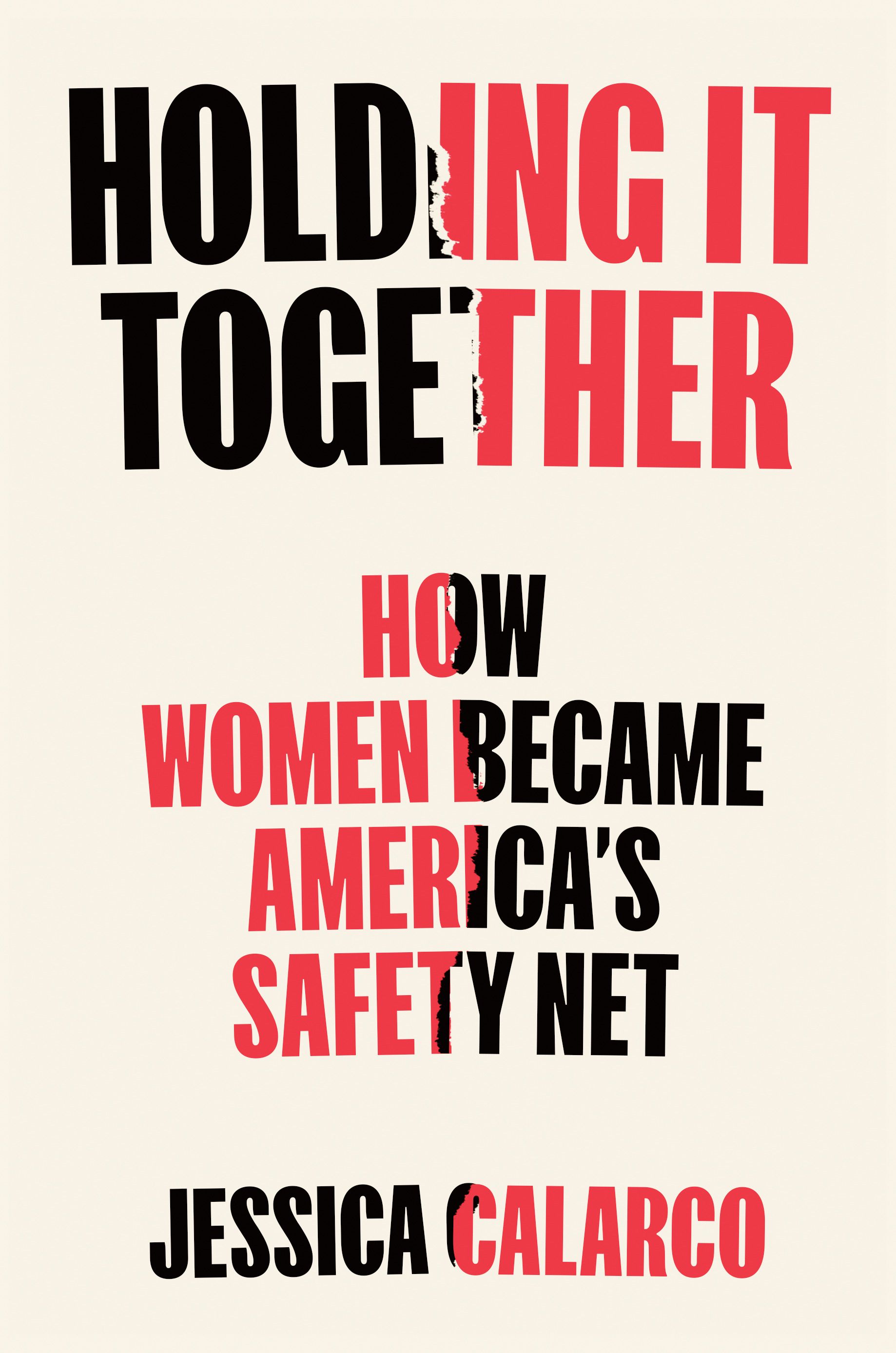Sociologist Jessica Calarco had been studying inequalities in family life and education for more than a decade when the pandemic pushed those inequities to the forefront. Suddenly, her research — surveying and interviewing hundreds of women as they move through their motherhood journey — was more relevant than ever. As moms across the U.S. scaled back their work to take care of their children (to a much greater extent than dads did), Calarco made a pithy observation that reverberated around the Internet: "Other countries have social safety nets. The U.S. has women."
In her new book, “Holding It Together: How Women Became America’s Safety Net,” Calarco breaks down why America has been slow to institute social safety net measures that our peer countries passed long ago, including paid family leave, affordable childcare and worker protections — measures that would help women get ahead in the workplace. Below, in an exclusive excerpt, she shares how one myth in particular perpetuates the problem. — Audrey Goodson Kingo

Photo Credit: Penguin Random House
When I was growing up, my parents had a copy of John Gray’s Men Are From Mars, Women Are From Venus that lived in a basket on the bathroom floor. I remember leafing through it and thinking that, even then, it seemed outdated. Yet, as we’ve seen with recent surveys and recent headlines, plenty of men are still buying what Gray is selling, which boils down to the idea that men and women are fundamentally different and that it’s best for society — and for individual men and women — if each plays their “natural” role.
Take, for example, Kansas City Chiefs kicker Harrison Butker, who, while speaking to a stadium full of new college graduates, addressed the “ladies present today,” and told them about how his wife Isabelle abandoned her own career plans, how “her life truly started when she began living her vocation as a wife and as a mother.”
Like Gray before him, Butker is spouting a version of the Mars/Venus myth, which suggests that sex sorts people into neatly gendered boxes — one pink, the other blue — and which also goes further in establishing a hierarchy, giving people a higher social value if they’re more pink or more blue than their box-mates, and putting the whole pink box below the blue.
Debunking the Myth
Recent research around sex, gender, and sexuality is clear, and it erodes the idea of a stark pink/blue binary. Research shows, for example, that spending time caring for young children — or even holding baby dolls — causes a drop in testosterone levels, and it does so for both women and men. Those drops in testosterone also make caregivers more sensitive to the needs of their charges. And those patterns become more pronounced the more experience someone has with caregiving. What that means, in turn, is that if more men and boys were given more early opportunities to practice, they might also seem “naturally” suited for caregiving roles.
In reality, men and women aren’t as different as we might expect. There aren’t, for example, distinctly masculine or feminine communication styles or systematically different masculine and feminine psychological traits. Instead, there’s a tremendous amount of overlap physically, psychologically, and temperamentally between men and women. Meanwhile, and to the extent that there are differences in the scripts that men and women follow, those differences are more a product of socialization than biology. In lab studies, for example, psychologists find that when adults are asked to interact with a boy baby or even a girl baby they assume is a boy (i.e., because she is dressed in masculine-typed clothes and called by a masculine-sounding same), they assume that the baby is stronger, more playful, and less sensitive, offer more masculine-typed toys, engage in more physical or aggressive play, and worry less about potential safety risks.
Why it Persists
To be an ideal worker — to put in long hours and prioritize their work commitments — men need someone managing all of life’s other responsibilities. The more hours that a man works for pay, the more likely his wife is to quit her job and become a full-time homemaker. And the less time that a woman spends working for pay, the more her husband is likely to earn. That’s particularly true for men who are higher up on the ladder — who have high incomes and professional careers. Gender specialization yields bigger financial advantages for these men than for other men, and the premium they get for having a stay-at-home wife has also increased substantially over time. Unfortunately, men can’t simply reject ideal-worker pressures or the incentives of having a stay-at-home wife. Employers are willing to reward men for being ideal workers even more so than they’re willing to reward women for doing the same.
The Mars/Venus myth emboldens men to get their wives or girlfriends or even their mothers to be the woman behind the man, by treating women as both the lesser and more nurturing of the two — as the helpmate who exists only to prop men up behind the scenes. Given how women are struggling under the weight of the risk we’ve dumped on their shoulders, it would be easy for men, especially relatively privileged men, to feel guilty about not doing more to ease the load that women are carrying. The myth, however, is a sort of inoculation against that kind of guilt. It reassures men that women are happier at home, that they’re better at domestic responsibilities than men are, and that men are even doing women a favor by not helping more with housework or childcare, because that way women won’t have to be the ones who clean up the mess when men get angry at the kids or leave a pen in their pocket in the wash.
That reassurance makes it easy for men to pay lip service to progressive gender ideals but abandon them in practice, especially when they become personally inconvenient, such as when they and their partners are deciding where to move for their careers, when they are deciding who should stay home with the kids when they’re sick or don’t have childcare, or when one partner loses their job.
What it Costs Us
Men’s lip service leaves women with little choice but to fill in the gaps, especially when kids are involved. It’s one thing to let the laundry pile up; it’s another to ignore the kids’ homework or leave them unfed. And since women will be judged more harshly for not caring, they’ll likely step up even if the men around them could be doing more.
For employed women, that stepping up means doing double duty or even triple duty, such as when they’re part of the sandwich generation, caring for children and aging parents, as well. All that responsibility at home can then set women back in their careers. If, for example, women ask for flexible work arrangements to make juggling paid and unpaid work easier, they risk being judged by their employers for doing so and evaluated more negatively than men. And even if women try to be ideal workers, they may still be passed over for jobs or paid less than their male counterparts, particularly if they have children at home. Those setbacks leave women vulnerable to being pushed out of the workforce, particularly if they earn less than their partners and if their family is struggling to pay for childcare. Those setbacks also compound over time, leaving women with less money to rely on in old age.
Women, however, aren’t the only ones who lose from the Mars/Venus myth. Men suffer under the weight of overwork pressures, which negatively impact their relationships and mental health. And we all lose out on the kind of safety net that would leave us more secure. Through surveys of more than 2,000 parents across the US, I find that more than half of all dads believe it’s best if moms stay home and don’t work for pay, and I find that the dads who think this way also disproportionately oppose programs like universal paid family leave, universal childcare, universal healthcare, and raising the minimum wage.
In essence, the Mars/Venus myth leaves us all worse off, in part, by allowing men like Butker to feel like good guys, even if they’re benefitting from the exploitation of women, and even if they oppose efforts to expand the social safety net. Because they can rest assured in their own (mis)perception that everyone is better off if women do the work of the social safety net instead.
Excerpted from "Holding It Together: How Women Became America’s Safety Net" by Jessica Calarco, in agreement with Portfolio, an imprint of Penguin Publishing Group, a division of Penguin Random House LLC. Copyright © Jessica Calarco, 2024.



